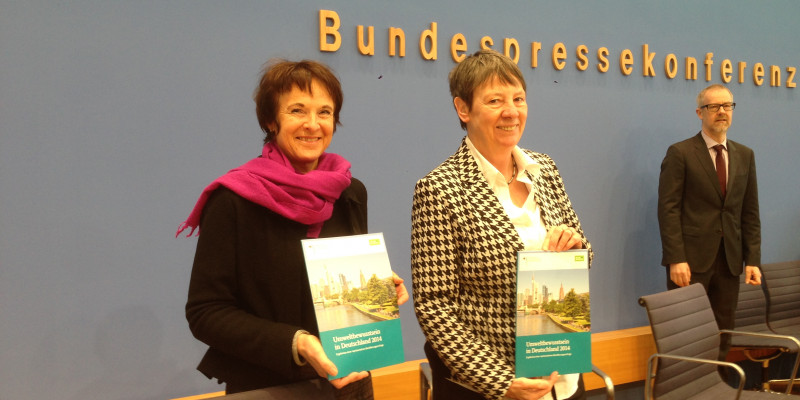Nearly two thirds of respondents (63%) report that environmental and climate protection are a basic requirement for coping with future tasks such as globalisation. That figure was only 40% in 2012. Nearly half of all the respondents consider protection of the environment and climate as a basic requirement for ensuring prosperity (56%), for maintaining Germany's competitiveness (48%) and creating jobs (46%).
Federal Environment Minister Barbara Hendricks said: "I interpret these results as a plea from the population directed at environmental policy. It was once commonly believed that environmental protection and economic strength was a contradiction in terms. Nowadays the opposite is true: living the good life and environmental protection go hand in hand."
The next hurdle is to establish environmental protection as a driver of social justice," continued Minister Hendricks. "The present study is lacking in this respect. It is my goal as Minister for Environment to get more people to say that environmental protection makes our country more just, because it is the people who are socially disadvantaged in particular who suffer from noise and particulates in our cities. Social environmental policy aimed at energy efficiency, local public transport, a greening of cities and the creation of liveable conditions in residential areas is good not only for the environment, but also for health and people's quality of life."
The study claims that noise is a major health problem: "Two thirds of the respondents feel some degree of disturbance from noise. One in every ten even says that noise is a "strong" to "very strong" disturbance. We have known for a long time that noise is more than just annoyance: it can reach a scale which causes illness," said President Maria Krautzberger of UBA. Road traffic noise is the greatest stress factor. As in the 2012 study, 54% of the respondents in the latest study reported feeling at least "somewhat disturbed" by noise.
The study proves there is a consistent, high level of environmental awareness among the population. Nearly nine of ten respondents believe that our lifestyle in Germany is also responsible for environmental problems in other countries. Nearly three quarters are worried about the environmental conditions in which our children and grandchildren will most likely have to live. This share is even higher (85%) among young people aged 14 - 17.
Environmental awareness is also high in some other sectors of consumption: nearly half of all respondents report that they "always" choose the energy-efficient alternative when buying household appliances or lighting. Another one fourth does this "very frequently". This shows that the commitment of the Federal Government to climate-friendly, energy-efficient and durable goods in the framework of the Ecodesign Directive corresponds to consumer desires.
UBA's President Maria Krautzberger said: "The demand for green products is high, and there is widespread willingness to make a switch to environmentally friendly alternatives. About 43% of respondents frequently buy ecological cleaning agents, 39% have tried out green electricity supply, and about one fifth are frequent purchasers of organic food products. The interest in ecological products varies, however; only 10% of respondents "frequently" buy ecologically produced textiles, for example. The manufacturers' supply in this sector is simply not yet adequate. Organic cotton currently has less than a 1% share of the entire cotton market. Manufacturers must speed up efforts and demand will follow", said Ms Krautzberger.
82% of respondents are in favour of changing the landscape of cities and municipalities in such a way that makes it practically unnecessary to use a car. That figure even goes up to 92% among young people aged 14 - 17. New mobility schemes in cities meet with high rates of approval. People are more and more willing to try out alternatives such as car sharing. A car sharing vehicle can replace five conventional vehicles and therefore has the potential to develop into a key factor for climate protection and resource efficiency.
The representative survey on environmental awareness in Germany has been carried out every two years since 1996. This year's survey included respondents in the German population as young as 14 years old (versus 18-year-olds and older in previous surveys). The current study was designed as an online survey carried out from 8 July - 6 August 2014 among 2,117 respondents.
 Click to enlarge
Click to enlarge
